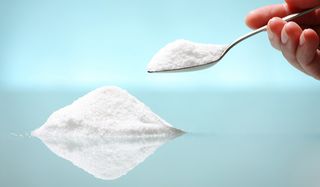what can massive amounts of salt lead to
Why Is Also Much Salt Bad for You?

Each week, MyHealthNewsDaily asks the experts to reply questions about your wellness.This week, nosotros asked diet experts: Why is too much common salt bad for y'all? Their answers have been edited and condensed for space.
Dr. Zachary Bloomgarden, professor at the Mount Sinai School of Medicine in New York Urban center:
The simple answer is that salt is associated with higher claret pressure. About 50 to 70 million people in the U.South. take hypertension, and all of them would do good from a low-salt diet.
Studies of the DASH diet (Dietary Approaches to Stop Hypertension) bear witness only how much of a difference salt intake can make. It's a very good for you, low-sodium diet, which has a lot of vegetables and not a lot of common salt. The DASH diet can drop high claret pressure significantly.
The problem is that salt is very tasty, just like saccharide. The combination of salt, sugar and fatty is unbelievably tasty. All mammals have the desire to swallow these bad foods.
The amount of salt that is available today, merely like the amount of saccharide that is bachelor today, is far across what we were meant to have in our diets.
+ + +
Rachel Johnson, professor of nutrition at the University of Vermont in Burlington:
Excess sodium increases claret pressure because it holds backlog fluid in the trunk, and that creates an added burden on the centre. Also much sodium will increase your adventure of stroke, middle failure, osteoporosis, tum cancer and kidney disease. And, 1 in iii Americans volition develop high claret pressure level in their lifetime.
Limiting your sodium is tough because nigh 75 percentage of sodium in Americans' diets comes from candy or prepared foods, not common salt that we add at the table. If you're a savvy nutrition label reader, information technology can be shocking.
Fifty-fifty foods such as breads and cereals tin have high amounts of salt. We call it a silent killer because a lot of people don't realize they have loftier blood pressure level.
+ + +
Marisa Moore, registered dietician and spokesperson for the Academy of Nutrition and Dietetics:
The average American eats about three,400 milligrams sodium a twenty-four hour period, but the recommended corporeality for a healthy person is two,300 milligrams a day. For people with loftier claret pressure level or diabetes, African Americans, and anyone who is historic period 51 or older, the daily recommendation is 1,500 milligrams of sodium.
So, most people are consuming double what they need in terms of salt.
For most people, a high sodium nutrition can lead to retaining fluid. And for some sensitive people, retaining fluid can lead to higher blood pressure, which puts someone at college hazard of stroke, heart affliction and kidney disease. Whenever y'all have a high claret pressure level, information technology causes your heart to take to work a lot harder and it tin can cause damage to claret vessels and the heart muscle itself.
+ + +
Stephanie Dunbar, registered dietician, director of Diet and Medical Affairs at the American Diabetes Association
Excess salt is has been linked to hypertension, and of course hypertension is a run a risk for heart illness. Some populations of people are very sodium sensitive, meaning when they consume sodium they retain fluid and their blood pressure level rises.
There'south some inquiry that shows if everybody reduced sodium in their nutrition, the rates of center disease in the The states would go fashion down.
With our current food production information technology's very difficult to cut out sodium. A slice of bread tin can have 250 milligrams of sodium lonely. Unless you get back to a diet where you're really cooking from scratch, and not using processed foods or canned foods, it'due south actually hard to reach that recommendation.
Salt has been used for hundreds of years as a preservative, and some food makers use it as a flavoring considering information technology's cheaper. Information technology's more expensive to use other herbs and spices to brand nutrient taste good better than to add salt.
+ + +
Mary Ellen DiPaola, outpatient dietitian at the University of California San Francisco Medical Centre
Sodium chloride, which we learn from table salt as well as from salted food products, is required for metabolic functions in the body and helps regulate fluid volume. The issue with sodium is similar to sugar: The average American consumes well to a higher place the recommended corporeality.
If we are consuming fresh, whole and natural foods, sodium intake can be reduced quite hands. Avoiding added salt, soy sauce or other salty condiments will also help reduce total sodium intake. Look for products less than 140 milligrams per serving, which is considered to be low in sodium.
Requesting less sodium added to foods in restaurants is some other means to reduce total daily sodium. More importantly, consider cooking at home with fresh foods and low sodium recipes.
And why should y'all lower sodium intake? Sodium in excess can increase claret force per unit area in those who have hypertension (high blood pressure), it tin make the trunk retain fluids which may cause swelling in susceptible individuals, and salty foods tend to also be loftier in total fat and calories – leading to backlog total calorie intake, overweight and obesity.
A long term trouble related to hypertension is kidney disease, a chronic illness which can lead to kidney failure.
Source: https://www.livescience.com/36256-salt-bad-health.html

0 Response to "what can massive amounts of salt lead to"
Post a Comment